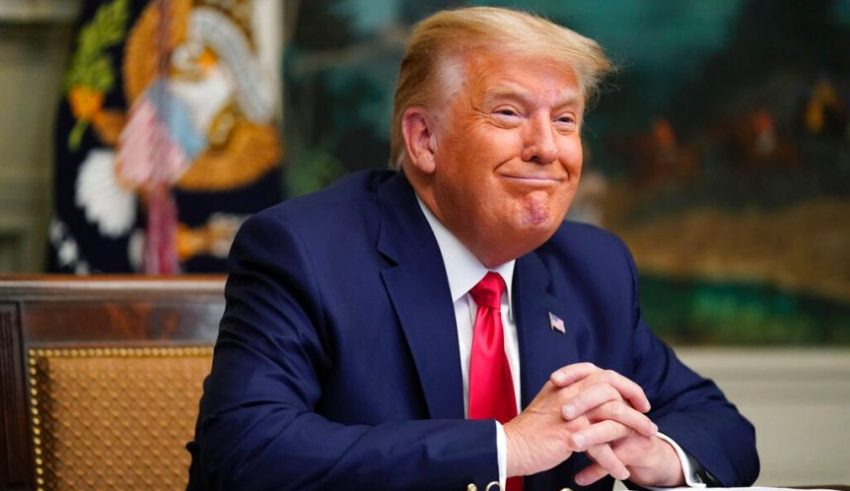
The US Senate has voted to acquit former president Donald Trump in his second impeachment trial.
A two-thirds majority — 67 or more guilty votes — was required to convict the former president.
Senators voted 57-43 guilty on the charge of incitement of insurrection.
In the vote, seven of the 50 Senate Republicans joined the chamber’s unified Democrats in favouring conviction.
The vote came at the conclusion of a five-day trial — Mr Trump’s second impeachment trial in 12 months — which was held in the same US Capitol building ransacked by his followers on January 6.
In a statement following the vote, Mr Trump said the trial had been another phase of the “greatest witch-hunt in the history of our country”.
He welcomed his second impeachment acquittal, thanking his attorneys as well as his defenders in the House and Senate, saying they “stood proudly for the constitution we all revere and for the sacred legal principles at the heart of our country”.
Though he was acquitted, the vote resulted in the largest number of senators to ever find a president of their own party guilty of an impeachment charge.
Republicans senators Richard Burr of North Carolina, Bill Cassidy of Louisiana, Susan Collins of Maine, Lisa Murkowski of Alaska, Mitt Romney of Utah, Ben Sasse of Nebraska and Patrick Toomey of Pennsylvania all voted guilty.
With Mr Trump having left office on January 20, a successful impeachment conviction could not have been used to remove him from power.
But Democrats had hoped to secure a conviction to hold him responsible for the Capitol siege that left five people, including a police officer, dead.
A conviction would have also set the stage for a vote to bar him from serving in public office again.
Given the chance to hold office in the future, they argued, Mr Trump would not hesitate to again encourage political violence.
McConnell says Trump responsible for provoking riot
Despite voting “not guilty” on the charge of incitement of insurrection, Senate Majority Leader Mitch McConnell said the former president held practical and moral responsibility for provoking the Capitol riot.
“There is no question that President Trump is practically and morally responsible for provoking the events of the day,” he said after the verdict.
“The people who stormed this building believed they were acting on the wishes and instructions of their president.”
But Senator McConnell said it was unconstitutional to convict Mr Trump now that he was out of office and a private citizen.
He said Mr Trump had orchestrated “an intensifying crescendo of conspiracy theories” and described the former president as “determined to either overturn the voters’ decision or else torch our institutions on the way out”.
But Senator McConnell suggested Mr Trump could yet face criminal prosecution for his acts.
“President Trump is still liable for everything he did while he was in office as an ordinary citizen,” Senator McConnell said.
“He didn’t get away with anything. Yet.”
‘A vote of infamy in the history of the US Senate’
Also speaking after the vote, senator Chuck Schumer said January 6 would live as a “day of infamy” in American history, and the acquittal vote would “live as a vote of infamy in the history of the United States Senate”.
The Senate’s top Democrat applauded the seven Republicans who joined Democrats in voting to convict Mr Trump.
But he called the day of the riot the “final, terrible legacy” of the former president, adding the stain of Mr Trump’s actions would never be “washed away.”
In delivering the House prosecutors’ closing arguments of the trial, Democratic congresswoman Madeleine Dean said senators were in a “dialogue with history”.
“What we do here, what is being asked of each of us here in this moment will be remembered,” she said before the vote.
During the trial, House prosecutors argued Mr Trump was the “inciter in chief”.
They argued he had embarked on a months-long orchestrated pattern of violent rhetoric and false claims — which they referred to as the “big lie” — that had unleashed the mob that stormed the Capitol.
The defence countered that Mr Trump’s words were not intended to incite the violence and that impeachment was nothing but a “witch-hunt” designed to prevent him from serving in office again.
Last month, the US House of Representatives impeached Mr Trump before he left office for incitement of insurrection.
It came in the wake of the violent mob breaking into the Capitol, destroying property and hunting for politicians as they counted the presidential electoral votes.
Mr Trump is only the third US president to be impeached by the House — a step akin to a criminal indictment — as well as the first to be impeached twice and the first to face an impeachment trial after leaving office.
But the Senate has never convicted an impeached president.






































 The World Observer Media produces a daily online newspaper, a daily Arabic online newspaper and a monthly printed Arabic/English magazine and a weekly printed Arabic/English newspaper.
The World Observer Media’s mission is to entertain and educate all generation from the Ethnic Communities in Australia, who are interested in local, national and foreign information.
The World Observer Media produces a daily online newspaper, a daily Arabic online newspaper and a monthly printed Arabic/English magazine and a weekly printed Arabic/English newspaper.
The World Observer Media’s mission is to entertain and educate all generation from the Ethnic Communities in Australia, who are interested in local, national and foreign information. 


